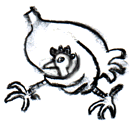A bizarre connection...
Here is a quote from Sir Philip Sidney's Defence of Poesie:
"Neither let it be deemed too sawcy a comparison, to ballance the highest point of mans wit, with the efficacie of nature: but rather give right honor to the heavenly maker of that maker, who having made man to his owne likenes, set him beyond and over all the workes of that second nature, which in nothing he sheweth so much as in Poetry; when with the force of a divine breath, he bringeth things foorth surpassing her doings: with no small arguments to the incredulous of that first accursed fall of Adam, since our erected wit maketh us know what perfection is, and yet our infected wil keepeth us from reaching unto it.23"
A bit mumbo-jumbo, I know, but as it was explained to me by Prof. Parkinson the sentiment behind this excerpt is that poetry enables individuals to grow intellectually- and that to grow intellectually is to strive toward the perfect state of being shared by Adam and Eve before their fall... um, yeah... BUT consider Frankenstein as a criticism of this very sentiment: to grow intellectually/scientifically- to tinker with nature in the hopes of bettering mankind is to, ironically "send us hurdling downward." (Bare with me- for Warren and Dustin who mentioned that they are currently taking 203 Critical Approaches this is a rough- and rather poorly paraphrased archetypal analysis of Frankenstein)
Can Dr. Frankenstein's failure be viewed as judgment?- did his experiment fail because his hunger for knowledge led him to repeat the original sin? And if so, can Frankenstein be seen as a text which suggests- no states- that the pursuit of knowledge is ultimately sinful?
"Neither let it be deemed too sawcy a comparison, to ballance the highest point of mans wit, with the efficacie of nature: but rather give right honor to the heavenly maker of that maker, who having made man to his owne likenes, set him beyond and over all the workes of that second nature, which in nothing he sheweth so much as in Poetry; when with the force of a divine breath, he bringeth things foorth surpassing her doings: with no small arguments to the incredulous of that first accursed fall of Adam, since our erected wit maketh us know what perfection is, and yet our infected wil keepeth us from reaching unto it.23"
A bit mumbo-jumbo, I know, but as it was explained to me by Prof. Parkinson the sentiment behind this excerpt is that poetry enables individuals to grow intellectually- and that to grow intellectually is to strive toward the perfect state of being shared by Adam and Eve before their fall... um, yeah... BUT consider Frankenstein as a criticism of this very sentiment: to grow intellectually/scientifically- to tinker with nature in the hopes of bettering mankind is to, ironically "send us hurdling downward." (Bare with me- for Warren and Dustin who mentioned that they are currently taking 203 Critical Approaches this is a rough- and rather poorly paraphrased archetypal analysis of Frankenstein)
Can Dr. Frankenstein's failure be viewed as judgment?- did his experiment fail because his hunger for knowledge led him to repeat the original sin? And if so, can Frankenstein be seen as a text which suggests- no states- that the pursuit of knowledge is ultimately sinful?



2 Comments:
Lesley's comment isn't really a bizarre connection at all. In fact, it raises some very interesting issues about the division of knowledge that occurred well after Sidney wrote his defence of poetry in the 16th century. Well into the 18th century, poetry and "science" weren't entirely separate entities, though they were on their way. At the end of the 18th century Erasmus Darwin (Charles' grandfarther), for example, wrote an incredible poem that was focused on the leading science of the day, on natural philosophy and botany, called Zoonomia. It was written in rhyming couplets, and peopled with poetic figures, but it espoused a theory on the origins of organic life from one vital spark that developed into various life forms. "Knowledge" was poetry and science.
All through the 18th century, the quest for knowledge was represented as an ideal and even spiritual pursuit to know, understand, and reveal God's works. There is also resistance to certain kinds of knowledge, however, and to some extent Frankenstein reflects this resistance. But I do think Shelley contrasts forms of knowledge: the knowledge given by nature to a blank-slate mind such as the creature's; the knowledge provided by "literary" texts - Milton's poetry for example; and the knowledge of the origins of life ("penetrating" Nature's secrets).
"grandfarther" indeed! I really wish we could edit comments like we can edit the primary posts!
Post a Comment
<< Home